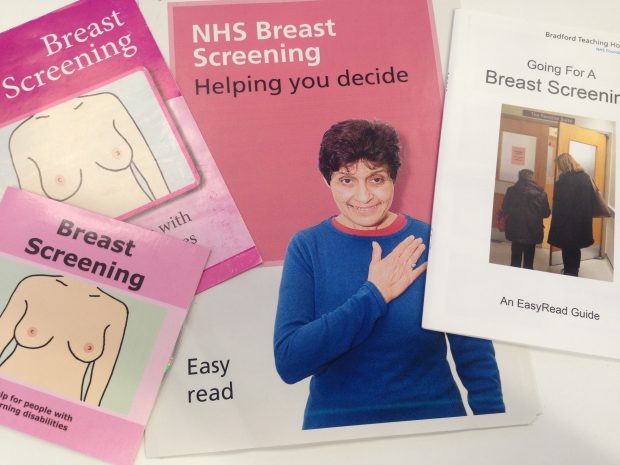Sharon Ashby and Deborah Rees are nurses working in Cornwall who are passionate about reducing inequalities experienced by people with learning disabilities. They are members of the PHE Screening expert group that has been helping to develop new and revised accessible easy read information about screening. In this blog article, they talk about the group’s latest workshop in Birmingham which focused on updating PHE Screening's easy read breast screening information and looking at easy read screening invitation/appointment letters.
Passionate about reducing inequalities
We have been working solely with the NHS screening programmes in Cornwall for the past 6 years and have been able to identify gaps in accessible information during that time.
Being part of the PHE Screening expert group workshops has been great because we are passionate about reducing the inequalities experienced by people with learning disabilities. The workshops have all included experts by experience – service users with learning disabilities – which reinforces the principle of ‘nothing about us without us’.
The aim of the workshops has been to develop and redesign national easy read information about all of the screening programmes.
The workshops involve a broad range of people, which is great because everyone brings something different. This includes different working backgrounds and different geographical areas. Everyone is listened to and it’s good being split into groups with a different set of people each time.

Sharing learning and resources
The latest workshop in Birmingham looked at breast screening information and screening invitation letters. The group included 6 experts by experience.
We were able to bring our experiences of working directly with women in Cornwall who are invited to attend for breast screening. In Cornwall we have a robust way of identifying women who may need extra support and who have different communications needs. This means we have a good idea of the barriers to attending screening and what works well to support women to attend.
The workshops are also very useful for sharing learning and resources with colleagues from other parts of the country. In Birmingham, for example, it was interesting to hear about editable letter templates developed by NHS Lanarkshire in Scotland.
PHE Screening is making good use of locally developed materials. It recently used resources we had developed in Cornwall, along with similar materials developed by the North East and Cumbria Learning Disability Network, as the basis for its new national guidance to support women with learning disabilities to access cervical screening.
Next steps
The next task for the national expert group will be to help finalise the new easy read breast screening leaflet. We hope it will be published by the end of the year.
Many challenges remain, including how to identify who needs accessible information because of a learning disability at the screening invitation stage. But we have a broad range of people working together to reduce screening inequalities and we are moving in the right direction.
PHE Screening blogs
PHE Screening BLOGs provide up to date news from all NHS screening programmes. You can register to receive updates direct to your inbox, so there’s no need to keep checking for new blogs.